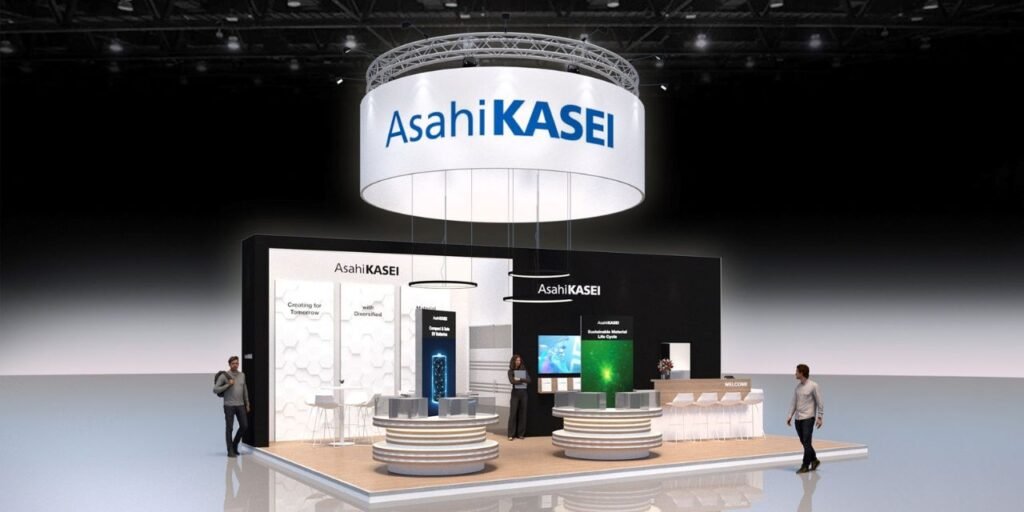
September 3, 2024, in Düsseldorf and New York From October 15–19 in Tokyo, Asahi Kasei, a Japanese technology business, will showcase its extensive array of diverse material solutions at Fakuma 2024, the world’s premier trade show for industrial plastics processing. Friedrichshafen, Germany. The polymer solutions for heat control are among the highlights. uses in electric vehicles, a new thermoplastic elastomer for enhanced recyclable automobile interior components and a high-performance 3D printed cellulose nanofiber composite publishing.
In three distinct areas—”Compact & Safe EV Batteries,” “Improved Connectivity & Lightweighting,” and “Sustainable Material Life Cycle”—Asahi Kasei will showcase its materials and solutions. The business will demonstrate the modified polyphenylene ether (mPPE) XYRONTM at the battery island. This material has the lowest ion elution characteristics and a good non-halogenic flame retardance. appropriate for use in EV batteries’ heat management applications. Asahi Kasei will also be present at Fakuma. multilayer cooling pipes that do not require an adhesive layer. These pipes consist of a combined of the business’s XYRONTM inside and LEONATM PA outside. This pipe provides outstanding low ion elution characteristics, resistance to hydrolysis, and bending properties.
Ways to enhance HMI and connection
Asahi Kasei is now releasing new grades of its all-around material XYRONTM to the European and North American markets in order to fulfill the growing need for materials that increase the efficiency of 5G applications. US markets. Polyphenylene sulfide (PPS) and other polymers are combined with PPE. or polystyrene (PS) enables the low dielectric constant of this class of high-performance compounds. attributes and a strong flame retardance that is non-halogenic. Utilizing a novel XYRONTM grade, the business has developed a resin antenna prototype in collaboration with the Tokyo Institute of Technology. Over a broad temperature range, this grade provides a consistent, low linear expansion coefficient together with strong heat resistance. This makes this material perfect for replacing metal in components and plating on plastics. need accuracy, such as slotted waveguide array antennas.
In recent years, there has been a steady increase in the requirements for optical devices with regards to weight and design, ranging from head-mounted displays and smart glasses to vehicle head-up displays. Due to its nearly low birefringence, the transparent polymer AZPTM is overcoming the obstacles traditional transparent polymers in polarizing light applications. Because of its enhanced processability allows the large-scale manufacturing of injection-molded optical components that satisfy requirements more easily than with glass. the exacting demands of the clientele.
For automakers, striking a healthy balance between usefulness and sustainability without compromising cost-competitiveness is a key concern. In order to address this issue, Asahi Kasei is now creating a grade of thermoplastic styrene block copolymer (SEBS) specifically tailored for car interior surfaces, which need to have a pleasant touch and nice haptics. Traditional methods make use of various materials and manufacturing processes used in the skin, foam, and core layers of automobile instruments panels, center consoles, armrests, or door panels. The updated SEBS material is safe to use on skin and foam layers, which a core back injection molding technique allows to be made in a single operation.
It is feasible to link to the polypropylene (PP)-based core layer during the same injection molding stage or a different one. There is no need for extra adhesive layers because of the strong chemical connection between all of the layers. The new SEBS from Asahi Kasei helps to cut down on the overall amount of materials, streamlining the production process and increasing the interior components’ capacity to be recycled.
PA66 recycling and CNF-reinforced polyamide applications for 3D printing
A cellulose nanofiber (CNF) that is both biobased and biodegradable will be on exhibit by Asahi Kasei. This material has a strong heat resistance and network-forming capacity. It is constructed of cotton linter. CNF-fortified since of its thixotropic characteristic, polyamide is a great material for 3D printing since it is simple to work with. printing, mechanical performance, smooth appearance, and dimensional correctness. Additionally, CNF is more recyclable than glass fibers as a material.
The business will also showcase its all-inclusive solutions for creating a PA66 life cycle that is sustainable. Microwave Chemical, a Japanese partner firm, and the corporation collaborate in the field of chemical recycling for polyamide 66. The process utilizes microwaves to depolymerize automotive airbags and other PA66 parts and directly obtain the monomers hexamethylenediamine (HMD) and adipic acid (ADA), which is expected to be accomplished at high yield with low energy consumption. The monomers obtained can then be used to manufacture new PA66.
Concurrently, Asahi Kasei will debut its novel solvent-based recycling method in Europe for the first time. Airbags and other discarded PCR materials may be converted into high-quality PA66 from process leftovers by using this dissolving recycling technique.
Asahi Kasei will have a display at Booth 5319 in Hall B5. To learn more, go to the following web page: Fakima’s website, asahi-kasei.eu.
Concerning Asahi Kasei
The Asahi Kasei Group improves people’s quality of life globally. Since its establishment in 1922 as a cellulose fiber and ammonia company, Asahi Kasei has continuously expanded through th proactively changing its range of business offerings to cater to the changing demands of all age groups. With additional With more than 49,000 workers globally, the business offers services that support a sustainable society. With its three business categories of Material, Homes, and Health, it offers answers to the world’s problems. Care. Its Material sector, comprised of Environmental Solutions, Mobility & Industrial, and Life Innovation, includes a wide array of products from battery separators and biodegradable textiles to engineering plastics and sound solutions. For more information, visit https://www.asahi-kasei.com/.
Asahi Kasei is committed to environmental efforts and is helping humanity achieve carbon neutrality by 2050. Go to https://www.asahi-kasei.com/sustainability/ to find out more.
